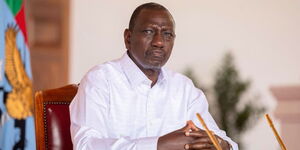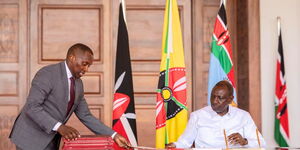Treasury Cabinet Secretary John Mbadi is among three leaders who snubbed summons after being directed to appear before the Senate Committee on Energy on Tuesday.
Mbadi was supposed to respond to alleged irregularities in the Construction of Line 5 (Mombasa-Nairobi) Pipeline with lawmakers looking for answers.
Committee members expressed their frustration over Mbadi's failure to snub the summon, a situation which was exacerbated by the fact that the Finance Minister did not issue an apology or give any reasons for his absence.
"The Cabinet Secretary for Treasury, John Mbadi did not give reasons for not appearing before the Senate Committee on Energy," Wahome stated as quoted by the official Parliament social media handles.
Besides Mbadi, Kenya Pipeline Managing Director Joe Sang, Auditor General Nancy Gathungu, and the Director General, Public Procurement Regulatory Authority(PPRA) Patrick Wanjiku were also scheduled to appear before the committee to shed light on the matter.
Sang however sent apologies to the Committee revealing that he had traveled to Saudi Arabia on official duty.
Auditor General Gathungu sent a representative but the committee turned her away on account that she was not a substantive office holder. Narok Senator Ledama Ole Kina expressly stated that the representative did not take oath of office and could therefore not purport to represent Gathungu.
Consequently, the committee resolved to give the leaders the opportunity to avail themselves at a later date.
Mbadi in his capacity as Finance Minister was supposed to give a detailed explanation on the questions raised by various stakeholders on the Mombasa-Nairobi Pipeline (Line 5).
The Mombasa-Nairobi pipeline, also known as Line 5, is a crucial infrastructure project managed by the Kenya Pipeline Company (KPC). Officially commissioned in 2018, this pipeline was constructed to enhance the transportation of refined petroleum products from Mombasa to Nairobi.
Spanning approximately 450 kilometers, the line was developed to replace the aging Line 1, offering a more efficient and reliable means of fuel delivery to Kenya's inland regions.
Line 5 has a capacity of up to 1 million liters of petroleum products per hour. This capacity significantly reduces the need for road transportation, thereby lowering logistical costs and minimizing the risks associated with fuel trucking.












